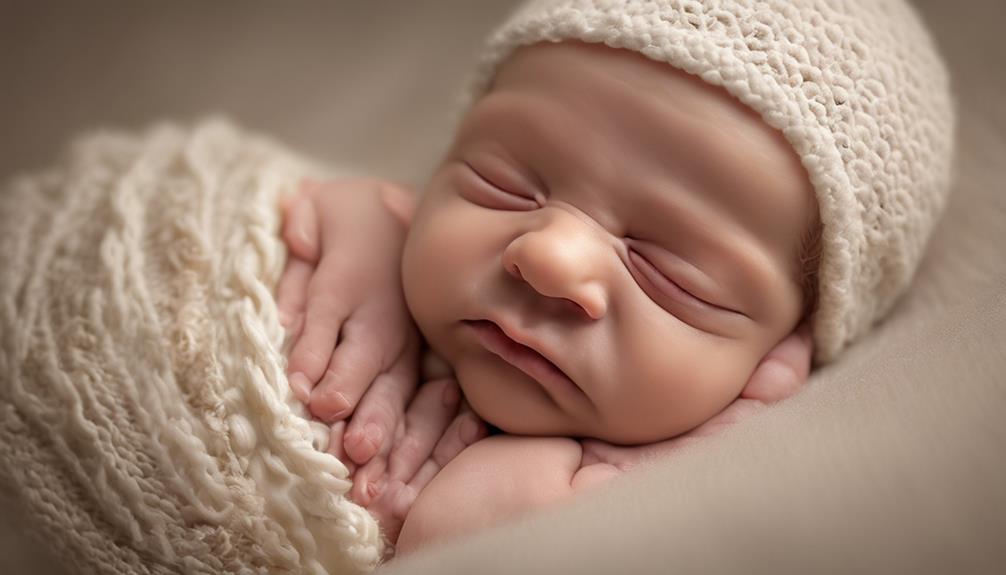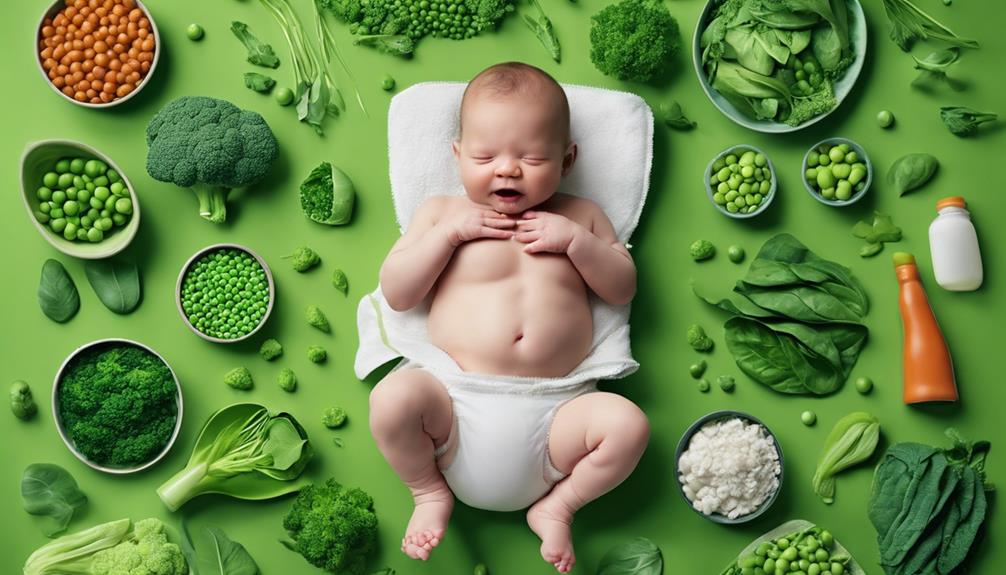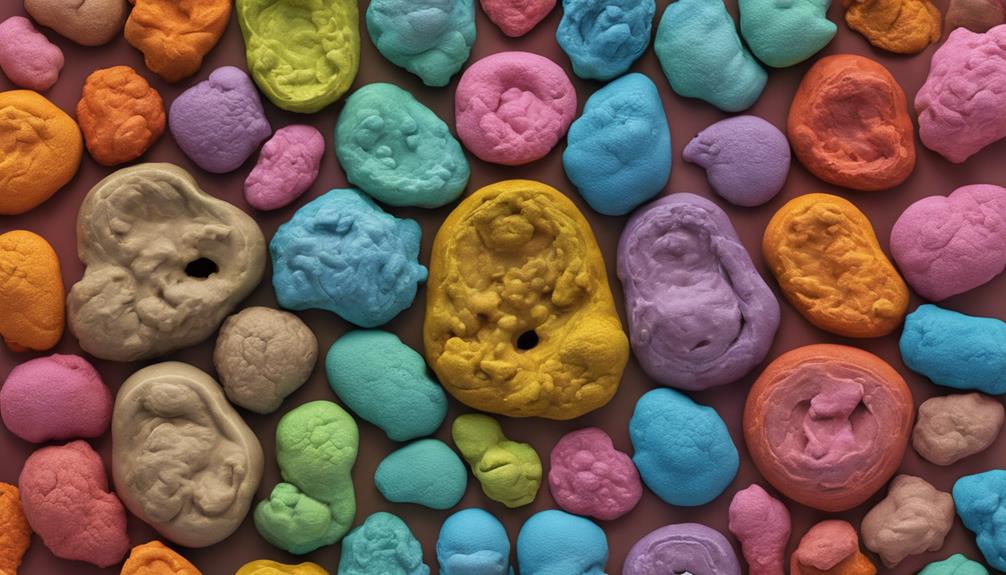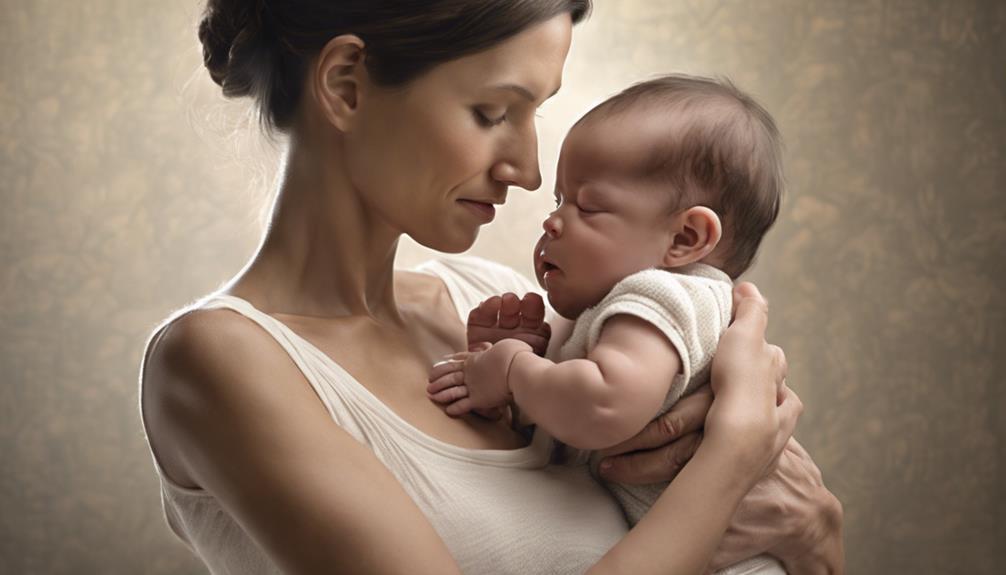Ever heard the saying, 'Hiccuping like a newborn baby'? Well, there's a reason behind why those little ones seem to hiccup so often. Understanding the causes behind newborn hiccups can shed light on this common occurrence and provide insights into how to manage them effectively.
From the way they feed to their developing digestive systems, a multitude of factors can contribute to those adorable but sometimes frustrating hiccups. So, what exactly triggers these frequent hiccups in newborns?
Key Takeaways
- Newborn hiccups are common due to swallowing air and fast milk flow.
- Hiccups post-feeding are normal and decrease as babies mature.
- Hiccups are harmless, part of development, and resolve on their own.
- Alleviate hiccups by burping, pacifiers, and keeping baby calm.
Common Causes of Newborn Hiccups
Newborn hiccups often occur due to your baby swallowing air while feeding. It's common for babies to gulp down air during feedings, especially if they're enthusiastic or if the milk flow is too fast. This swallowed air can irritate the diaphragm, leading to those adorable yet sometimes concerning hiccups. Ensuring your baby is in an upright position during and after feedings can help prevent excessive air intake. Additionally, being mindful of not overfeeding your little one can also reduce the likelihood of hiccups.
Sometimes, the immature digestive system of newborns can also play a role in triggering hiccups. Factors like sudden changes in temperature or even gastroesophageal reflux disease (GERD) can contribute to these pesky hiccups. While hiccups are usually harmless and tend to lessen as your baby grows and their system matures, understanding these common causes can help you navigate and alleviate your baby's discomfort.
Frequency of Hiccups in Newborns

If your newborn frequently experiences hiccups, understanding the typical frequency and patterns can offer reassurance and help you respond appropriately. Newborns can have hiccups multiple times a day, especially after feedings, which is quite common. These hiccups are usually short-lived, lasting from a few minutes to an hour. As your baby grows, you may notice that the frequency of hiccups tends to decrease over time. However, if your newborn experiences prolonged hiccups, lasting longer than usual, it could be a sign of an underlying issue that requires attention.
| Frequency | Commonality |
|---|---|
| Multiple times a day | Common occurrence |
| After feedings | Frequently observed |
| Decrease over time | Normal as baby grows |
Impact of Hiccups on Newborns
Experiencing hiccups as a newborn can be a common occurrence that typically doesn't cause discomfort or disrupt daily activities. It's crucial to understand that baby hiccups, although frequent, usually don't interfere with your little one's breathing or feeding routine.
These hiccups are considered a normal part of newborn development and tend to pass on their own without any need for intervention. The diaphragm and digestive system of newborn babies are still maturing, which can contribute to the occurrence of hiccups.
While it's natural to be concerned, rest assured that in most cases, these hiccups are harmless. They aren't usually a cause for worry and don't require specific treatment. However, if your baby seems uncomfortable or if the hiccups persist for an extended period, seeking medical advice is advisable.
Simple remedies like Gripe Water or addressing potential issues like acid reflux can sometimes help alleviate hiccups in newborns. Remember, Babies Get Hiccups, and it's usually a normal part of their early development.
Ways to Alleviate Newborn Hiccups

To help alleviate newborn hiccups, consider implementing simple techniques like burping your baby during and after feedings to release trapped air that can trigger hiccups. Offering a pacifier to your little one may also help regulate their breathing patterns, potentially reducing the frequency of hiccups.
Keeping your baby in a calm and quiet environment is another effective way to ease hiccups, as stress and excitement can sometimes exacerbate them. Additionally, holding your baby upright after feeding can prevent stomach distention, which in turn may reduce the occurrence of hiccups.
If these methods don't provide relief, you could consult your healthcare provider about trying gripe water or simethicone drops, as these remedies are known to help relieve newborn hiccups under medical guidance. Remember, each baby is unique, so it may take some trial and error to find the most effective strategy for alleviating your baby's hiccups.
When to Seek Medical Advice for Newborn Hiccups

When your newborn's hiccups persist for more than an hour despite trying soothing techniques, seeking medical advice is recommended. It's natural to worry about your little one, but knowing when to seek help can provide peace of mind.
Here's when you should reach out to your healthcare provider:
- Consult a healthcare provider if newborn hiccups are accompanied by other concerning symptoms like difficulty breathing or feeding. Your baby's well-being is the top priority, and any signs of respiratory or feeding issues shouldn't be overlooked.
- If newborn hiccups interfere with sleep patterns or cause distress to the baby, it's advisable to seek medical guidance. Your pediatrician can offer insights on managing these hiccups effectively and ensuring your baby's comfort.
- Prolonged or frequent hiccups in newborns, especially if they seem unusually severe or disruptive, warrant consultation with a pediatrician. Your healthcare provider can assess the situation and provide tailored recommendations to address any underlying concerns promptly.
Frequently Asked Questions
What Causes Frequent Hiccups in Newborns?
Frequent hiccups in newborns are often caused by air swallowing during feeding, an immature digestive system, sudden temperature changes, overfeeding, and gastroesophageal reflux. These triggers irritate the diaphragm but are generally harmless and decrease with age.
How Do I Stop My Newborn From Having Hiccups?
To prevent newborn hiccups, try burping during and after feedings, offer a pacifier, keep them upright, and gently rub their back. Remember, avoid adult remedies. These simple steps can help ease your baby's discomfort and reduce hiccups.
Should I Worry if My Baby Gets Hiccups a Lot?
Don't fret if your baby hiccups a lot; it's usually normal. Hiccups can be due to their developing systems. Keep an eye out for persistent hiccups with other symptoms and seek advice if concerned.
Is It OK to Lay Baby Down With Hiccups?
Yes, it's okay to lay your baby down with hiccups. Hiccups don't typically affect breathing. If hiccups persist or cause distress, consulting a pediatrician is wise. Keeping your baby upright if they have reflux can help prevent vomiting.
Conclusion
Now that you understand why newborns get hiccups often, remember that it's a normal part of their development.
Knowing how to alleviate hiccups can help ease your baby's discomfort.
If you ever feel worried or unsure about your baby's hiccups, don't hesitate to reach out to your healthcare provider for guidance.
Your baby's well-being is important, and seeking help when needed can provide you with peace of mind.









